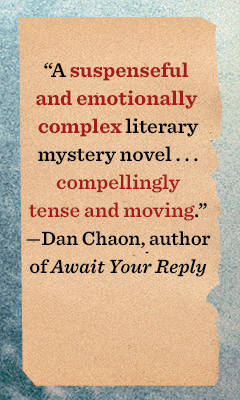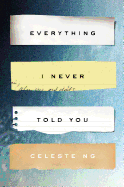Everything I Never Told You
by Celeste Ng
In a quietly shattering debut, Celeste Ng pulls readers into an American family whose lives are shaped not by a tremendous skeleton lurking in the closet, but by the smothered dreams and fears of inadequacy lurking in their own hearts. When their carefully constructed illusions are fractured, the strength of willing vulnerability may be their only way back to life and to each other.
"Lydia is dead. But they don't know this yet." One ordinary morning in 1977, 16-year-old Lydia Lee doesn't come to the breakfast table. Although the police assure the Lee family that most missing teen girls come home on their own, they find Lydia's body in the nearby lake two days later. While no evidence points to foul play and police immediately suspect suicide, each member of the Lee family has a separate theory. Her father, James, believes Lydia killed herself because she had no friends. Her mother, Marilyn, is sure someone murdered her favorite child. Her brother, Nathan, suspects their neighbor, the school bad boy, of complicity. Only her little sister, quiet, insightful Hannah, knows that none of their theories can be correct, but her youth prevents her from articulating that her parents and brother will never find Lydia's truth as long they continue to see her motivations and fears as identical to their own.
After opening with the tragedy, Ng catapults the reader back to the beginning, before Lydia's birth. "How had it begun? Like everything: with mothers and fathers.... Because more than anything, her mother had wanted to stand out; because more than anything, her father had wanted to blend in." Ostracized and treated as a curiosity in the Midwest because of his Chinese ancestry, James originally found himself drawn to blonde, pretty Marilyn because she represented the Caucasian societal norm he could not achieve, her love a tacit legitimization of his worth. But Marilyn herself never fit society's narrow view of normalcy, either. As a young woman in the late 1950s, Marilyn's gender alone made her an outcast at college as she worked toward a medical degree, and while her mother encouraged her to leave school with a husband rather than a degree, Marilyn's choice to marry a Chinese-American man led to estrangement from her only family.
Ng delves into the human tendency to mask and bandage our insecurities, and the damage we inflict on ourselves and our relationships by not admitting our fears and dreams aloud. James and Marilyn create an environment for their children in which seeming outweighs being, simply out of their best efforts to shelter their children from the struggles and disappointments they themselves had faced. When Lydia dies, the structure of their family dynamic not only crumbles but causes monumental miscommunication rooted in the secret interior spaces James and Marilyn have created to hold their private hurts. At one point, James lashes out at Marilyn, "You have no idea what it's like, being different.'" Marilyn, however, is living in "the hypothetical past perfect, the tense of missed chances." She never told James how deeply the loss of her opportunity to become a doctor hurt her, not even upon the death of her estranged mother, a home economics teacher "who had planned on a golden, vanilla-scented life but ended up alone," pushing Marilyn to find the doting husband she herself never had, despite Marilyn's own dreams.
At one time, when Lydia and her brother, Nathan, were small, meditating on her mother's failure at her personal goals sparked a decision in Marilyn that left Lydia wondering for a time "how everything had changed in just one day, how someone she loved so dearly could be there one minute, and the next minute: gone." The impossibility of rectifying her own failure leaves Marilyn repeating her mother's mistakes in controlling Lydia's choices, and in a way also leads to Marilyn wondering in her turn how Lydia could so quickly vanish. Both parents put so much stock in Lydia--Marilyn because Lydia represents her younger self, James because Lydia takes after her Caucasian side more than her two siblings--that Nath and Hannah are marginalized. Bright Nath toils away unsupported in his dream of becoming an astronaut, torn between jealousy of his parent's favoritism toward Lydia and his bond with her, the sister who has shared his life. Much younger Hannah becomes the forgotten child, living as an observer in her own family, and even though "she knew that something had shifted inside her sister, that she was balanced on a dangerous, high-up ledge," Hannah cannot break the cocoon of her silence.
Ng dissects the dynamics of the Lee family and presents the details with the same precision James finds in Lydia's autopsy report, but with considerably less finality. While Lydia met a dire fate, the Lee family's self-repression is balanced by resilience. Readers will ache as the characters break away from each other, but Ng's gentle voice keeps alive the hope that lessons may be learned, rifts mended. Ultimately filled with the promise of renewal, this delicately crafted drama destroys, only to heal. --Jaclyn Fulwood








_Kevin_Day_Photography.jpeg)